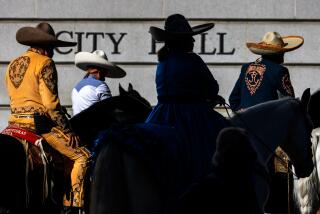CYPRESS : Council Agrees to Let Woman Keep 3 Horses
- Share via
At the far end of Gay Street, past the chickens and just across the road from costly two-story homes, lives Gail Simonz.
She, like several of her neighbors, was drawn to her secluded lot now in the northern tip of Cypress because it was one of the few places left that allowed farm animals.
But since establishing the Silver Spur Hoss Motel more than 13 year ago, Simonz has been engaged in a constant battle to stave off developers who want her out. This week, she is finally claiming victory.
In a unanimous decision, the City Council agreed to allow Simonz--and the three horses she loves--to stay. “The city told me they wanted to protect the animal lovers,” said Simonz. “And they did protect them. I am very happy.”
Gay Street, which is located off Crescent Avenue near Denni Street and the Southern Pacific Railroad, was annexed by the city in 1988. At that time, it was an unincorporated area of Orange County and zoned for agriculture. As many as 200 horses once lived on the block, along with an assortment of chickens, rabbits and dogs.
When the city took over the area, it extended special consideration for the animals. But harboring animals was considered a “nonconforming” use of property that the city intended to eventually phase out.
Today, only a handful of livestock owners are left. Many of the ranchers have sold their property and gone inland to such areas as Chino, where it is cheaper to raise livestock and avoid urban encroachment.
But Simonz, who came in 1977, is entrenched. A large landscaped archway welcomes visitors to her mini-ranch, where she houses her three horses--Joe, Ruby and Lacee. Simonz has a county license to board horses but says she does so only occasionally for a friend. “They are my hobby,” she explained.
A vacant lot behind her property--once home to an Arabian horse ranch--has been eyed by several developers.
But her latest battle involved a 12-unit housing development. The proposal called for the homes to be built on the edge of her property line, only 10 feet from the yellow barn and the riding arena.
According to city codes, livestock must be kept at least 50 feet from a residential area. “If there is a complaint and the council declared (the livestock) a public nuisance, they would have to be removed,” City Atty. Jerry M. Patterson told the council.
Still feeling reverberations from an unpopular decision to remove rabbits from a nearby park, the council sided with the animals. “I would like to condition it so somehow (Simonz’s) property is protected,” said Councilwoman Margaret M. Arnold.
The council decided to allow the development but promised at a later meeting to provide a variance stipulating that the horses can be closer than 50 feet to the residential area.
The project’s developers have also agreed to work with their equine neighbors to accommodate their special needs. “We are trying to do everything we can,” said Larry Johnson, one of the developers. “(Simonz) takes very good care of her property. We will take the horses into consideration.”
Simonz has requested that the homes be limited to one story because the horses don’t like having objects over their heads. In return, she has promised to keep the stable area as clean as possible. A special air-cleaning device has been installed to deter odor and flies. To maintain her license with the county, she also must pass an inspection every year.
More to Read
Sign up for Essential California
The most important California stories and recommendations in your inbox every morning.
You may occasionally receive promotional content from the Los Angeles Times.













